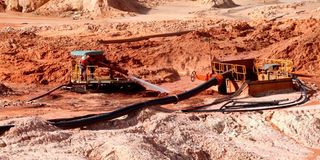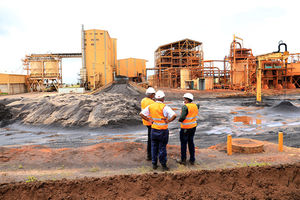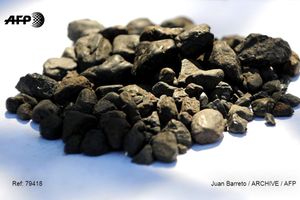
Operations at the Base Titanium Mining Plant in Kwale County in this photo taken on June 29, 2022.
Kwale-based Australian mining firm Base Titanium, Kenya’s largest mining company, will officially exit in the next two months, leaving behind thousands of jobless residents and a county government still grappling with unpaid royalties worth nearly Sh900 million.
By June 30, 2025, Base Titanium will shut its doors after more than a decade of operations, concluding its once-booming mining activities.
The company, which had employed more than 1,600 workers over the years, ceased mining activities at the end of 2024, citing depletion of commercially viable mineral reserves.
However, the firm’s departure has caused widespread anxiety and anger among locals, leaders, and the Kwale County Government. Many now say that while the community benefited immensely from employment opportunities and corporate social responsibility programmes, the promised royalties — a vital source of funding for long-term development — have yet to be fully disbursed.
“The company helped us over the past 10 years. But now, we urge the national government to release the royalties we were promised. We are now jobless, and the money could change our lives," said Juma Mwaguzo, a resident of Mvumoni village.

Kwale Governor Fatuma Mohamed Achani.
Kwale Governor Fatuma Achani has consistently pushed for the release of the funds, saying the money is rightfully owed to the people who hosted the mining operation.
The Sh900 million represents 10 years’ worth of mining profits that were to be shared with the county government and the local community under the Mining Act and agreements signed when Base Titanium began operations.
Mining Principal Secretary Hillary Kimtai acknowledged the issue, saying the government is working with the National Treasury to ensure every party receives their share before Base Titanium's exit.
“We don’t want any complaints from the community or the county government when the company finally leaves,” Mr Kimtai said.
In the 2023 financial year alone, Base Titanium paid about $15.5 million in mineral royalties to the government.

Final mining activities at Base Titanium in Msambweni, Kwale County on May 7, 2024.
In the year ending June 2022, the company paid Sh3.9 billion in royalties and Sh3.44 billion in corporate and withholding taxes.
Yet, little of that money has found its way back to the community, despite growing expectations.
The firm’s initial investment in Kenya dates back to 2010, with over Sh48 billion ($380 million) spent on project development.
Base Titanium has been instrumental in raising the profile of Kenya’s mining sector, contributing approximately 65 percent of the country’s mineral output by value.
Adding to the tension surrounding Base Titanium’s departure is the controversy over the disposal of the company's assets.
The company has contracted WH Auctions, a leading industrial auctioneer, to conduct an online webcast sale of more than 300 lots of mining, construction, plant and electrical equipment.
The auction, scheduled for May 14 and 15, will, however, exclude Kenyan buyers.
Only international buyers are allowed to bid, a decision that has sparked outrage among local companies and leaders.
According to the auction terms, all assets are designated "for export only", with buyers responsible for managing export permits, customs clearance, logistics, and transport.
Base Titanium defended its move, saying the sale is compliant with the original investment agreements signed with the Kenyan government, which exempted imported equipment from customs and VAT taxes.

Duruma dancers on February 12, 2025 during a function to witness the final bulk titanium ore minerals export from Base Titanium Company. The Mv Devbulk Sinem left Likoni channel in Mombasa port with 4,200 metric tonnes of titanium ore.
Selling the equipment locally would trigger duties and taxes, making domestic disposal financially unfeasible, the company argued.
“Assets are private property, and the company has the constitutional right to dispose of them as it sees fit, including selling them internationally to fund rehabilitation and mine closure costs,” the company said in a statement.
It added that other assets, including processing facilities, will be handed over to the government at no cost, benefiting the people of Kwale.
Despite the disputes, Base Titanium has been praised for its commitment to environmental restoration.
Having spent over Sh1 billion in compensation to affected communities, the company has now shifted its focus to restoring mined-out areas.
According to its rehabilitation plan, the company is reshaping the land into dunes resembling the original landscape to maintain natural drainage patterns.
Topsoil spreading, manuring, and mulching are being done to enhance organic matter and encourage vegetation regrowth.
Mr Kimtai, the Mining Principal Secretary, said that the government is finalising post-mining land use discussions with the company.

Mining Cabinet Secretary Hassan Joho on October 10, 2024 leads a tree planting exercise at Base Titanium Mining Company in Msambweni, Kwale. Some 45,000 trees were planted.
The Post-Land Mining Use Committee, composed of government and community stakeholders, has been engaging on how best to use the rehabilitated land once mining operations are concluded.
“Base Titanium has already restored 55 percent of the mined land, in line with the Mining Act 2016. The National Environment Management Authority (NEMA) has also provided guidance to ensure the land is returned to a usable state,” Mr Kimtai said.
Infrastructure projects handed over include a 132kV power station to Kenya Power for local electricity distribution and a dam to Coast Water Works, which will build a treatment plant to supply clean water to the community.
Still, uncertainty hangs over the future of Kwale’s economy once Base Titanium exits. The firm’s presence had provided employment, healthcare support, educational programmes, and improved infrastructure — benefits that the community fears will vanish without adequate planning.
“Without the mining company, the region risks slipping back into poverty unless the government steps in quickly to create alternative livelihoods,” warned Salim Mwakio, a civic leader in Kwale.
Meanwhile, Base Titanium is seeking a 10-year extension of its special mining licence to allow it to conclude post-mining activities properly.
The company has been operating in Kwale for over a decade and concluded its mining operations in December 2024 due to the depletion of commercially viable ore.
Base Titanium operations manager Devham Vickers said the company has been acquired by American mineral resources firm–Energy Fuels—in a cash-and-stock deal valued at about Sh30.8 billion ($240 million).
Energy Fuels is a US-based uranium and critical minerals producer and the deal is said to be strategic in creating “a global critical minerals business”.










